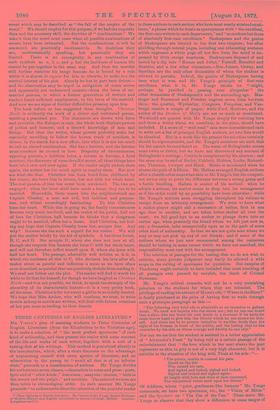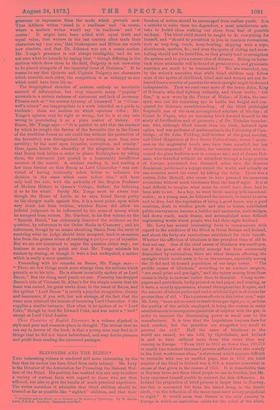THREE CENTURIES OF ENGLISH LITERATURE.* MR. Y0NGE'8 plan of assisting
students to Three Centuries of English Literature (from the Elizabethan to the Victorian age), is to make a selection of "the most perfect specimens" of each 'kind of authorship, and then present the reader with some account of the life and works of each writer, together with a sort of a tasting-dish of his writings. This method is postulated silently in the introduction, which, after a short discourse on the advantage -of acquainting oneself with every species of literature, and an admonition to the young to "avoid all that is of an inferior olass," proceeds to a classification of authors. Mr. Yonge divides his authors into seven classes,—dramatists in verse and prase ; poets, lyric and of "other kinds ;" historians ; essayists ; orators, "both in the senate and the pulpit ;" and novelists. The selected writers are then taken in chronological order. In such manner Mr. Yonge proceeds " to endeavourtodirectthe attention of the youthful reader
• Three Centuries of English Literature. By Charles Duke Yonge, Regius Professor -of Modern History and English Literature in Queen's College, Belfast. London: Longmana and Co.
to those authors in each section who have most nearly attained excel- lence," a phrase which he treats as synonymous with" the excellent, the first-rate writers in each department," and "no authors but those of absolutely first-rate excellence." Shakespeare and the genius of Shakespeare are treated in the first two chapters ; but after plodding through several pages, including one exhausting sentence which engrosses a whole page all but five lines, the mind is im- pressed by little except weariness. Shakespeare disposed of and tasted by a dip into "Romeo and Juliet," Falstaff, Benedict and Beatrice, and a few other characters,—Ben Jonson, Otway, and Sheridan are the only other dramatists of whom the student is allowed to partake. Indeed, the geuius of Shakespeare having been what it was, and Mr. Yonge's principle of first-rate
excellence what it is, Mr. Yonge thinks he " might, perhaps, be justified in passing over altogether" the other dramatists of Shakespeare's and the succeeding age. Mes- singer and Beaumont and Fletcher engross seven lines between them ; the quartet, Wycherley, Congreve, Farquhar, and Van- brugh receive a couple of pages ; while Ford, Marlowe, and the author of the Duchess of Malfy are not so much as mentioned.
We should not quarrel with Mr. Yonge simply for omitting here and there a writer whom we ourselves, in his place, should have included. If a score of " well-read " men were commissioned each to write out a list of principal English authors, no two lists would be identical. But in a work like the present the selection certainly should be representative, and Mr. Yonge's omissions are such that his list cannot be considered so. The name of Bolingbroke mews some twice or thrice, but we have not discovered any account of Bolingbroke's writings ; Crabbe is conspicuous by his absence ; and the same may be said of Butler, Cobbett, Hobbes, Locke, Richard- son, Thomson, Cowper and Hood. Steele is mentioned when he crosses the path of Addison. Mr. Hallam arranged English authors after a classification somewhat akin to Mr.Youge's, but the compari- son serves only to point the difference between a strong grasp and a feeble handling. Hallam is master of his method : when he adopts a scheme, his matter seems to drop into his arrangement as if the order could by no possibility have been otherwise ; while Mr. Yonge's matters seem struggling throughout his volume to escape from an arbitrary arrangement. We seem to have what a racket-player might call a succession of rallies, first in one age, then in another, and are taken helter-skelter all over the court; we bid good-bye to an author to plunge down into an earlier age, when presently the friend whom we left just now as, say, a dramatist, bobs unexpectedly upon us in the garb of some other kind of authorship. So that we are not quite sure where we may or may not pick up any of our friends ; and if some of the authors whom we just now enumerated among the omissions should be lurking in some corner which we have not searched, the responsibility must rest with the arrangement.
The selection of passages for the tasting-dish we do not wish to criticise, sines private judgment may fairly be allowed a wide scope in the culling of specimens for quotation. But samples of Thackeray ought certainly to have included that most touching of all passages ever penned by novelist, the death of Colonel Newcome.
Mr. Yonge's critical remarks will not be a very nourishing pabulum to the students for whom they are intended. The privilege of reading his extract of Moore's ode, "Where is the Slave?"
is dearly purchased at the price of having first to wade through such a grotesque paragraph as this :—
"The following very brief ode is admirable as an incentive to gallant deeds. We need not inquire who the slaves are; but no one can doubt that a slave who can burst his own bonds is a recreant if he waits for some braver hand to give him the liberty which he can secure for him- self. And there can be no greater incentive to warlike deeds than the sight of the foeman in front of the soldier, and the feeling that he has comrades by his side on whose courage and fidelity he can rely."
Nor can we see that the student is assisted to a better appreciation of "Alexander's Feast" by being told at a certain passage of the entertainment that "the love which in the next stanza the poet represents as akin to pity is not of a very high character, but it is suitable to the situation of the king with Thais at his side :"— " The prince, unable to conceal his pain,
Gazed on the fair Who caused his care, And sighed and looked, sighed and looked, Sighed and looked and sighed again: At length with love and wine at once oppressed, The vanquished victor sunk upon her breast."
Of Addison, whose "quiet, gentleman-like humour" Mr. Yonge
commends, we have two specimens, viz., the "Vision of Mirza " and the Spectator on "The Use of the Fan." These move Mr. Yonge to observe that they show a difference in some usages of
grammar or expression from the mode which prevails now. Thus Addison writes 'stand in a readiness' and ` in course, where a modern writer would say in readiness' and of course.' It might have been added with equal truth and 'equal value, that writers in the last century often made their characters say 'you was,' that Shakespeare and Milton use words now obsolete, and that Dr. Johnson was not a comic author. Mr. Yonge's grammar is not always intelligible, and we are not sure what he intends by saying that, "though differing in the motives which drew them to the field, Dalgetty is not unworthy to be placed alongside of the immortal lover of Dalcinea." If he means to say that Quixote and Captain Dalgetty are characters which resemble each other, the comparison is as unhappy as any which could have been hit on.
The biographical sketches of authors embody an inevitable amount of information, but they resemble many " popular " accounts in a certain rashness of statement and lack of accuracy.
Phrases such as "the severer tyranny of Cromwell" or " Crom- well's crimes" are inappropriate to a work intended as a guide to students ; these are matters on which opinions differ ; Mr.
Yonge's opinion may be right or wrong, but he is at any rate wrong in postulating it as a plain matter of history. Of Bacon, Mr. Yonge says :—" It is painful to add that the conduct by which he sought the favour of the favourite (for in the Court of the worthless James no one could rise without the protection of the favourite) was distinguished by something more than mere servility; by the most open injustice, corruption, and cruelty." Here, again, beside the absurdity of the allegation or inference that Bacon took bribes in order to please Buckingham by taking them, the statement just quoted is a lamentably insufficient account of the matter. A student reading it, and reading a few lines further on that Bacon as Lord Chancellor "was con- victed of having habitually taken bribes to influence his decision in the cases which came before him," will have only half the tale, with the authority of the Regius Professor of Modern History in Queen's College, Belfast, for believing it to be the whole. Surely Mr. Yonge must be aware that though the House of Lords, as he says, found Bacon guilty on the charges made against him, it is a moot point, upon which very much has been written, whether Bacon did allow his judicial judgment to be influenced by the sums of money which he accepted from suitors. Mr. Gardner, in his first volume on the "Spanish Match," has elaborately dissected the evidence on the question, by references to the Order Books in Chancery ; and his inferences, though by no means absolving Bacon from the error of receiving what no judge should have accepted, tend to exonerate him from the grosser crime of rendering a quid pro quo of injustice.
But we are not concerned to argue the question either way ; our business is merely to point out that Mr. Yonge misleads his readers by stating, as though it were a fact undisputed, a matter which is really a moot question.
Proceeding with his remarks on Bacon, Mr. Yonge says :— "There are few things much more strange than the mistake which prevails as to his title. He is almost invariably spoken of as Lord Bacon." But the thing need puzzle no one. Posterity has dropped Bacon's title of Viscount St. Alban's for the simple reason that his fame was earned, his great works done, in the name of Bacon, and the epithet "Lord Bacon" is merely a popular recognition, clumsy and inaccurate, if you will, but not strange, of the fact that the same man attained the honour of becoming Lord Chancellor. Coke supplies a similar instance. How often is he spoken of as "Lord Coke," though he died Sir Edward Coke, and was never a "lord" except as Lord Chief Justice.
Three Centuries of English Literature is a volume slipshod in style and poor and common-place in thought. The utmost that we can Bay in favour of the book, is that a young man may find in it things that he did not know beforehand, and may derive pleasure and profit from reading the extracted passages.



































 Previous page
Previous page